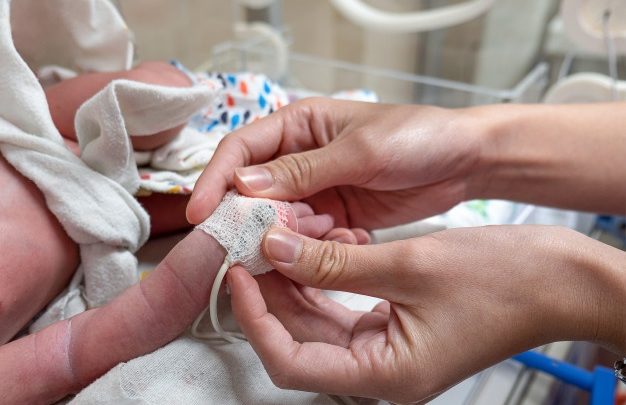Birth trauma
Every parent awaiting the birth of their child has high hopes for their future, their health, happiness and overall well being. Many women and men speak about a fear during pregnancy that there is something wrong with their unborn child. For some parents, this fear becomes a reality as their child is deemed medically unwell or is diagnosed with a serious illness or disability. This can occur immediately after birth due to prematurity, birth complications or illness or it can be something that occurs years into childhood or even adulthood. Any parent hearing their child has a chronic or life-threatening illness is at risk of experiencing significant psychological distress. Even before any diagnosis, the treatment the child undergoes can prove traumatic for parents and can often leave a long lasting impact over their psychological well being. In the fourth edition of the Diagnostic and Statistical Manual of the American Psychiatric Association (APA, 1994) “ learning that one’s child has a life threatening illness” was added to the list of events traumatic enough to lead to posttraumatic stress disorder.
Consider the baby who is born premature; an estimated 15 million babies were born prematurely around the globe in 2010 (Lasiuk et al, 2013). When a parent gives birth prematurely they are often, with little warning, forced into an alien world of the Intensive Care Unit (ICU) or medical ward. One particular study looked at the experience of parents following the birth of their infant prematurely. Lasiuk et al, 2013 found that parents in this situation spoke about feeling frightened and disoriented. This stress was still evident for those parents who were informed that the chance of delivering a premature infant was high, meaning that preparation does not appear to decrease the fear associated with this event (Lasiuk et al, 2013). Parents remember the initial alarm or fear they experienced by the urgent activity of medical staff after the birth in the delivery room and the immediate transfer of their baby to the ICU. Fathers in particular spoke about the dilemma of where to go, do they stay with their partner or go with their baby? Women spoke at length about their feelings of guilt and inadequacy and their lack of trust in their bodies, their womanhood and their abilities as mothers. Upon transfer to the ICU, these parents reported feeling extreme stress, which was compounded by the environment, the lack of medical knowledge and the constant noise and beeping from machines; each one triggering fear in the parent as they were unsure of its meaning. These parents were forced to rely on strangers to keep their infant alive and thought about nothing else but the survival of their child (Lasiuk et al, 2013). Parents spoke about the uncertainty of their infant’s health as a major stressor, as one small change could alter the infant’s health status from stable to critical in a split second and again trigger a fear of loss in the parent (Lasiuk et al, 2013). The APA describes a traumatic event as one that threatens an individual’s life or integrity (or the life/integrity of a loved one) and evokes a sense of helplessness and horror. Premature birth was traumatic for parents in this study as it altered their perceptions, strained their coping responses, and triggered a range of physical, emotional, and behavioural responses including fear, anxiety, grief, depression, changes in appetite and sleep patterns and social withdrawal, (Lasiuk et al, 2013).
Past systematic review indicated that Post Traumatic Stress Disorder (PTSD) symptoms was not uncommon in parents of premature infants (Pierrhumbert et al., 2005) In one study they reported the rates of PTSD symptoms at 67 % for mothers with preterm infants (Holditch-Davis et al, 2003), another found all mothers of premature infants had significantly more rates of PTSD symptoms at 1-3 days, 14 days, 6 months and 14 months post birth (Kersting et al, 2004). While a more recent study, Jubinville et al, 2012, found that 3 years after birth of their premature infant, parents reported vivid memories related to the child’s early life, their appearance, behaviour, pain, procedures and anxiety. Miles et al, 2007, reported that over half of mothers in their study (63%) had scores indicting significant risk of depression following the birth of their premature infant. They noted that this risk declined after 6 months for some mothers. However, mothers whose children remained in hospital or were rehospitalized or who reported ongoing worry about their infant, had more depressive symptoms throughout the first year of life. Studies have shown that parental trauma following the birth of a premature infant is less related to birth weight, Apgar scores or length of stay in ICU and is more related to the parental challenges about being unable to care for their child (Shaw et al, 2006). Factors such as being unable to hold their infant, unable to help their child, or care or protect them from procedures or pain were included in these difficulties.
These type of reactions and psychological difficulties are not just observed in parents of premature infants. Similarly in receiving a diagnosis of a congenital anomaly, parents speak about feeling a sense of shock around hearing that there is something wrong, as often they were unaware of any medical difficulties (Mitchell, 2004) and having to digest a lot of new and anxiety provoking information (Aitc, Zaccara, Trucchi et al, 2004). They also reported a sense of grief as the diagnosis is conceptualised as the loss of a healthy child (Jones, Statham & Solomou, 2005). There are also reports of reactions including shock (Chaplin et al, 2005), sadness and anxiety (Aitc, Zaccara, Nahom et al, 2004) and anger, guilt, despair and frustration (chaplin et al, 2005). These reactions often manifest in behaviours such as crying, isolation, sleeping and eating problems (Chaplin et al., 2005). Receiving a cancer diagnosis for your child has also been highlighted as one of the most severe stressors that a parent can experience (Kazak, 1998). Studies of parents whose child is facing a diagnosis and/or treatment for cancer showed increased levels of PTSD symptoms compared to parents of healthy children (Barakat et al., 1997; Brown et al, 2003). Further studies reported that these increased symptoms persist for many years beyond the completion of the child’s treatment. Kazak and colleagues (2005) found that 68% of mothers with children in active treatment for cancer, reported PTSD symptoms in the moderate to severe range. Further studies speculated that the initial diagnosis may cause an increase in post traumatic symptoms but the real increase in symptoms occurred when children were engaged in active treatment (Weiss & Marmar, 1997; Kazak et al., 2005).
Apart from the emotional difficulties outlined around coping with their child’s chronic illness, parents often endure further distress when facing the everyday burdens of trying to organise everyday life outside the hospital. Parents in many studies speak about the financial strain of having a child with medical difficulties, particularly for men and women who are self employed and those who were already struggling financially prior to the illness (Lasiuk et al, 2013). Other reported sources of financial stress included childcare for other children, transportation and parking, specialist equipment and eating costs while staying at the hospital (Lasiuk et al, 2013).
There are many things that parents felt helped them to cope with this very difficult time;
- Hope played a big role in managing their future coping.
- Parents benefit from psycho education at the point of diagnosis around common emotional reactions to a chronic illness of any kind (Fonecca et al., 2011).
- Following this finding specific ways to help parents to understanding their needs and feelings and find ways to help them cope with the symptoms of anxiety and trauma that they face are all very important aspects.
The first few moments and days after a diagnosis were critical in determining the future adaption to these new set of difficulties (Doherty et al, 2009). It is very important that all parents deemed at risk for development of PTSD symptoms or psychological distress receive access to a Paediatric Psychologist in order to reduce the severity of the symptoms and to reduce future psychological distress. One study found that women who received psychological intervention had fewer symptoms of PSTD than did controls. They also had fewer feelings of self-blame, and were more confident about future pregnancies (Gamble et al 2005). Another study found that when psychological therapy is delivered between 1 month and 6 months after the incident, there is evidence suggesting it is effective for people at risk of developing chronic PTSD (NICE Guidelines, 2005).
Sign up today for unlimited access:
- Book appointments
- Expert advice & tips
- Premium videos & audio
- Curated parenting newsletters
- Chat with your bloss community
- Discounts & competitions
- Special events





Leave a Rating / Review
You must be logged in to post a comment.